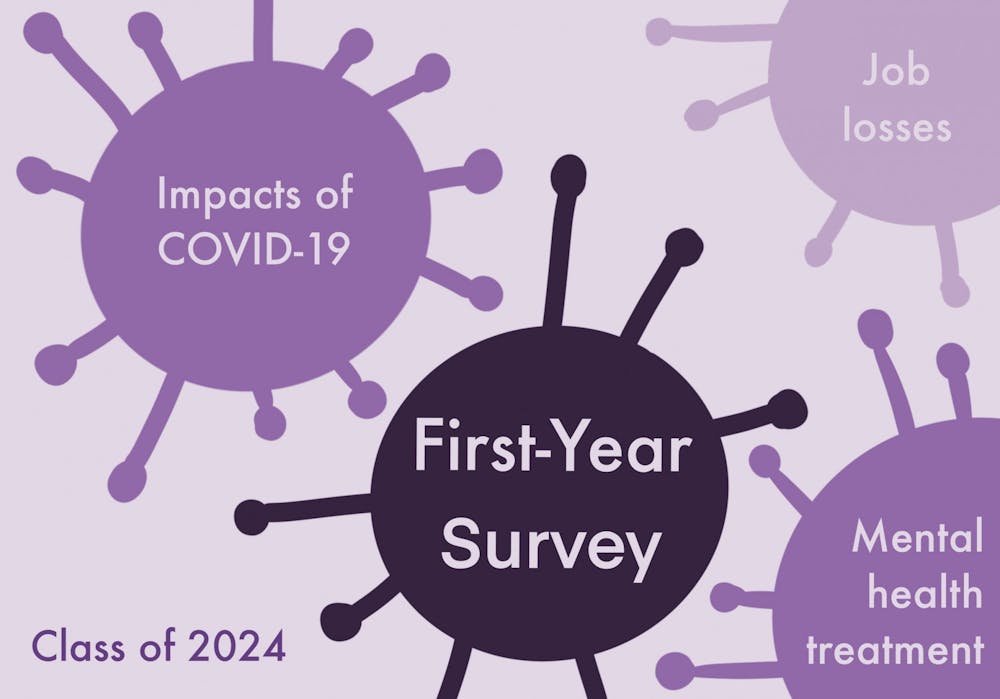Editor's note: This story is part of a series about the Class of 2024 based on a survey conducted by The Chronicle. You can read more about our methodology and limitations here, or see all of our survey coverage here.
When the Class of 2024 matriculated at Duke, they brought along with them the pain of the impacts of COVID-19 on themselves, their family and their close friends.
The Chronicle’s first-year survey asked students about how COVID-19 has affected them, including whether summer or travel plans were affected, whether someone in their household had lost their job and whether they had family members or close contacts who had died of the virus.
As U.S. unemployment rates spiked during the pandemic, 7.4% of first-years reported having a member of their household lose their jobs, and 7% responded that someone was furloughed. COVID-19 deaths have now surpassed 400,000 and about 4% of first-year respondents reported a family member or close contact dying due to COVID-19.
Almost all first-years—93.6%—who responded to our survey said COVID-19 affected their summer or travel plans. In addition to receiving their financial aid package, 7.7% of respondents requested additional COVID-19 relief funds from Duke.
Nearly half of students who received relief funds had someone in their family lose their job or be furloughed due to COVID-19 or preferred not to say.
While on campus, only five respondents, 1.7%, tested positive for COVID-19, while 82 first-years, 28.3% of the respondents, knew someone else who did.
Furthermore, given that the coronavirus pandemic has exacerbated the ongoing mental health crisis at Duke and in the nation, The Chronicle asked first-years about their past experiences with mental health treatment in its survey. However, the survey questions merely asked respondents whether they received treatment for mental health before, and did not directly ask about mental health experiences during COVID-19.
Rural students most likely to experience household job loss or furlough
Students from rural communities were more likely than suburban or urban students to have had a household member lose their job or be furloughed due to the coronavirus pandemic. Of the surveyed rural students, 27.8% indicated household members either lost jobs or were furloughed, compared to 12.7% of suburban students and 18.4% of urban students.

Lower-income households more likely to be impacted by COVID-19
Students from lower-income households were more likely to have a household member that lost their job or was furloughed due to the pandemic. Both 20% of students in the below-$40,000 income bracket and 21.4% of students in the $40,000-$80,000 bracket reported that a household member lost their job or was furloughed. In contrast, 7.5% of students in the $250,000-$500,000 income bracket and 9.5% of students in the above-$500,000 bracket indicated that a household member lost their job or was furloughed.
Compared to 8.4% of first-years from the upper three income brackets, 11.8% of first-years from the lower three income brackets indicated that a family member or close contact died from COVID-19. Students in the $40,000-$80,000 income bracket were most likely to report that a family or close contact died.
Students in the below-$40,000 income bracket were the most likely to prefer not to say whether a family member or close contact died from COVID-19.
This is consistent with nationwide trends that the coronavirus has hit low-income populations the hardest, with low-income adults suffering disproportionate job loss and death risk.

Get The Chronicle straight to your inbox
Sign up for our weekly newsletter. Cancel at any time.
Black, Hispanic students more likely to have family or close contact die from COVID-19
Consistent with nationwide trends, COVID-19 had a disproportionate impact on the Class of 2024 along racial and ethnic lines. Black or African American students were more than three times as likely to have a family member or close contact die from COVID-19 than non-Hispanic white students.
It is important, however, to take into account the low number of Black or African American students represented in The Chronicle’s survey. (Read more about our methodology and limitations.)
Hispanic and Latinx students were nearly eight times as likely as non-Hispanic and Latinx students to have a family member or close contact die from COVID-19.

Note: The “American Indian or Alaska Native” category was excluded from analysis because it contained only one student. There were only three students in the "Other" category.
Every respondent who indicated they had lost someone to COVID-19 voted or planned to vote for Joe Biden in the 2020 presidential election.
Black students most likely to request COVID-19 relief funds
Black or African American first-years were the most likely to request COVID-19 relief funds—26.7% of Black or African American students, 12% of multiracial students, 9.2% of Asian students and 4.3% of white students did so. Non-Hispanic and Latinx students were more likely to request funds than Hispanic and Latinx students—8.1% compared to 5.3%.

All students who received COVID-19 relief funds and were eligible voted for Biden and identified their political beliefs as “moderate,” “somewhat liberal” or “very liberal.”
Asian, Pratt students least likely to have received mental health treatment
Consistent with nationwide trends, Asian students were least likely to have received treatment for mental health relative to other racial groups, excluding the “other” racial category. Compared to 44% of multiracial students and 26.7% of non-Hispanic white students, 12.4% of Asian students reported receiving mental health treatment.

In addition, first-years enrolled in the Trinity College of Arts and Sciences were more than three times more likely to have received some form of mental health treatment than first-years enrolled in the Pratt School of Engineering. In comparison to 8.8% of Pratt students, 29.8% of Trinity students reported having received assistance.


Preetha Ramachandran is a Trinity senior and diversity, equity and inclusion coordinator for The Chronicle's 118th volume. She was previously senior editor for Volume 117.

Stefanie Pousoulides is The Chronicle's Investigations Editor. A senior from Akron, Ohio, Stefanie is double majoring in political science and international comparative studies and serves as a Senior Editor of The Muse Magazine, Duke's feminist magazine. She is also a former co-Editor-in-Chief of The Muse Magazine and a former reporting intern at PolitiFact in Washington, D.C.

